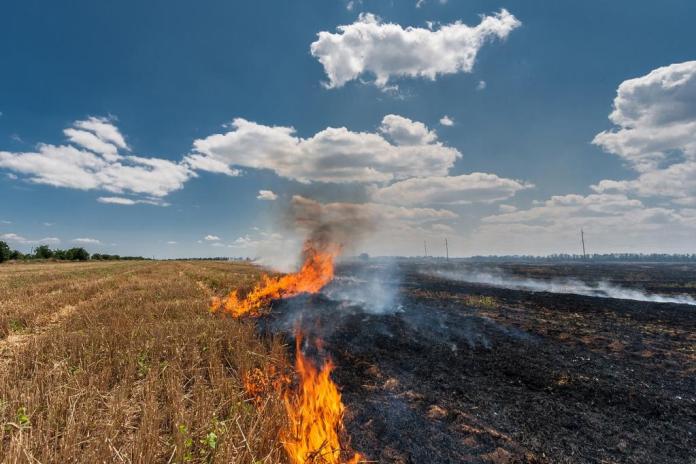Stubble Burning
Stubble Burning is the intentional burning of Crop residue by farmers to remove them from the field in order to prepare fields for sowing next crop. Stubble burning results in emission of harmful gases such carbon dioxide, Sulphur dioxide, nitrogen dioxide along with particulate matter so it causes problem for the environment, agriculture and humans. It was a common practice in Punjab, Haryana, Rajasthan and western Uttar Pradesh, but nowadays it’s spreading in other parts of the country also.
Advantages of Stubble Burning
- It is the cheapest and quickest way to deal with crop waste.
- It destroys weeds including those that are resistant to herbicides.
- It kills other pests also, such as slugs.
- It can decrease nitrogen tie-up.
Effects of Stubble Burning:
- Pollution:
- Open stubble burning emits large amounts of toxic pollutants in the atmosphere which contain harmful gases like methane (CH4), Carbon Monoxide (CO), Volatile organic compound (VOC) and carcinogenic polycyclic aromatic hydrocarbons.
- After the release in the atmosphere, these pollutants disperse in the surroundings, may undergo a physical and chemical transformation and eventually adversely affect human health by causing a thick blanket of smog.
- Soil Fertility:
- Burning husk on the ground destroys the nutrients in the soil, making it less fertile.
- Heat Penetration:
- Heat generated by stubble burning penetrates into the soil, leading to the loss of moisture and useful microbes.
What measures needs to be taken?
- Properly cut Stubble can be used to make bio-char or cellulosic ethanol, burn in a power plant or plant the next crop without tillage.
- Bio-char is a fine-grained, carbon-rich, porous product remaining after straw has been subjected to pyrolysis at low temperatures in an environment with little or no oxygen.
- Bio-char can improve water retention and increased soil surface area when used with other fertilisers.
What can be a viable solution?
-
- A farmer’s economic compulsions dominate his decision to burn stubble.
- Incentives from power generators and ethanol manufactures to farmers bringing stubble will provide solution for this.
- Super SMS (straw management system) is an attachment that fits onto the combine harvesters for paddy, spreads residue evenly over the field.
- It should be deployed while cutting the stubbles.
- Initiatives should be taken to market biochar as a nutrient and private players should be involved for the infrastructures required.
Alternatives to Stubble Burning
 One such method is using a Turbo Happy Seeder (THS) machine, which can uproot the stubble and also sow seeds in the area cleared. The stubble can then be used as mulch for the field.
One such method is using a Turbo Happy Seeder (THS) machine, which can uproot the stubble and also sow seeds in the area cleared. The stubble can then be used as mulch for the field.- Another possible alternative is the Pusa bio-decomposer, developed by the scientists at the Indian Agricultural Research Institute, which turns crop residue to manure in 15-20 days by accelerating the decomposition process.
- In-situ treatment of stubble: The government is currently giving equipment to farmers to mix the stubble back into the soil, so that they do not have to burn it.
- Ex-situ treatment: Under this, some companies have started collecting stubble for their use, but we need more action on this front.
- Changing cropping pattern: It is the deeper and more fundamental solution.
- Subsidise crops other than paddy, the source of most stubble burning. Policy and money should incentivise farmers in the region to plant more fruits and vegetables. India needs more vitamins and protein rather than wheat and rice.” This will create more greenery and since vegetable and fruit crops don’t leave stubble, it’ll bring down the number of open fires.
Way Forward
- Small and marginal farmers need support for adoption of in-situ strategies, to mulch the straw into the soil and not burn it.
- Imposing a fine is not going to work in our socio-economic conditions for curbing stubble burning. We need to focus on alternative solutions.
- Although the government is distributing but everyone is not getting the machines for in-situ management. The government should ensure their availability to everyone.

 One such method is using a Turbo Happy Seeder (THS) machine, which can uproot the stubble and also sow seeds in the area cleared. The stubble can then be used as mulch for the field.
One such method is using a Turbo Happy Seeder (THS) machine, which can uproot the stubble and also sow seeds in the area cleared. The stubble can then be used as mulch for the field.